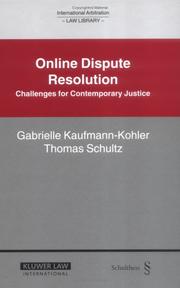| Listing 1 - 3 of 3 |
Sort by
|
Book
ISBN: 051184851X 1107206367 1282723502 9786612723506 0511788576 0511786700 0511789300 0511785569 0511777558 0511787847 9780511789304 9780521515429 0521515424 9780511786709 9780511787843 9780511777554 Year: 2010 Publisher: Cambridge New York Cambridge University Press
Abstract | Keywords | Export | Availability | Bookmark
 Loading...
Loading...Choose an application
- Reference Manager
- EndNote
- RefWorks (Direct export to RefWorks)
Alternative dispute resolution has now supplanted litigation as the principal method of dispute resolution. This overview of dispute resolution addresses practical developments in areas such as family law, plea bargaining, industrial relations and torts. The authors elaborate on the necessary legal safeguards that should be taken into account when developing technology-enhanced dispute resolution and explore a wide range of potential applications for new information technologies in dispute resolution.
Dispute resolution (Law) --- ADR (Dispute resolution) --- Alternative dispute resolution --- Appropriate dispute resolution --- Collaborative law --- Conflict resolution --- Dispute processing --- Dispute settlement --- Justice, Administration of --- Mediation --- Neighborhood justice centers --- Third parties (Law) --- Automation. --- Law --- General and Others --- Dispute resolution (Law) - Automation

ISBN: 9041123180 3725548536 9789041123183 Year: 2004 Publisher: The Hague Kluwer law international
Abstract | Keywords | Export | Availability | Bookmark
 Loading...
Loading...Choose an application
- Reference Manager
- EndNote
- RefWorks (Direct export to RefWorks)
Dispute resolution (Law) --- Arbitration and award --- Electronic commerce --- Automation. --- Law and legislation. --- Mediation --- Good offices (Mediation) --- Conflict management --- ADR (Dispute resolution) --- Alternative dispute resolution --- Appropriate dispute resolution --- Collaborative law --- Conflict resolution --- Dispute processing --- Dispute settlement --- Justice, Administration of --- Neighborhood justice centers --- Third parties (Law) --- Automation --- Law and legislation --- International private law --- Computer. Automation --- Dispute resolution (Law) - Automation. --- Arbitration and award - Automation. --- Electronic commerce - Law and legislation.
Book
ISBN: 1107201667 9786612058516 0511507739 1282058517 0511508395 0511504780 0511509057 0511506929 9780511508394 9780511576102 0511576102 9780521896207 0521896207 9780511504785 9781107201668 661205851X 9780511507731 9781282058514 9780511509056 9780511506925 Year: 2009 Publisher: Cambridge, UK New York Cambridge University Press
Abstract | Keywords | Export | Availability | Bookmark
 Loading...
Loading...Choose an application
- Reference Manager
- EndNote
- RefWorks (Direct export to RefWorks)
The internet has the potential to increase the number of cross-border disputes between a wide range of different users. For many internet disputes, the use of Online Dispute Resolution (ODR) becomes critical. ODR uses information technology (such as expert systems) and internet communication applications (such as webforms or web filing platforms) to resolve disputes outside the courts. Although ODR is a progeny of ADR, using some of the same processes such as mediation and arbitration, ODR is also different in that it adds new and transformative technology and processes. This book sets out the process standards with which ODR, and in particular online arbitration, should comply and shows how these standards can be implemented in the real world. It considers applicable law and enforcement, thus providing a blueprint of how online arbitration processes should be devised.
Dispute resolution (Law) --- Due process of law. --- Electronic commerce --- Commercial law --- Access to justice (Due process of law) --- Procedural due process --- Substantive due process --- Civil rights --- Justice, Administration of --- ADR (Dispute resolution) --- Alternative dispute resolution --- Appropriate dispute resolution --- Collaborative law --- Conflict resolution --- Dispute processing --- Dispute settlement --- Mediation --- Neighborhood justice centers --- Third parties (Law) --- Automation. --- Law and legislation --- Law and legislation. --- Law --- General and Others --- Electronic commerce - Law and legislation --- Dispute resolution (Law) - Automation --- Due process of law --- Electronic commerce - Law and legislation - Great Britain --- Dispute resolution (Law) - Great Britain --- Australie --- Royaume-Uni --- France --- Allemagne --- Hong Kong --- Suède --- Suisse --- Etats-Unis
| Listing 1 - 3 of 3 |
Sort by
|

 Search
Search Feedback
Feedback About UniCat
About UniCat  Help
Help News
News